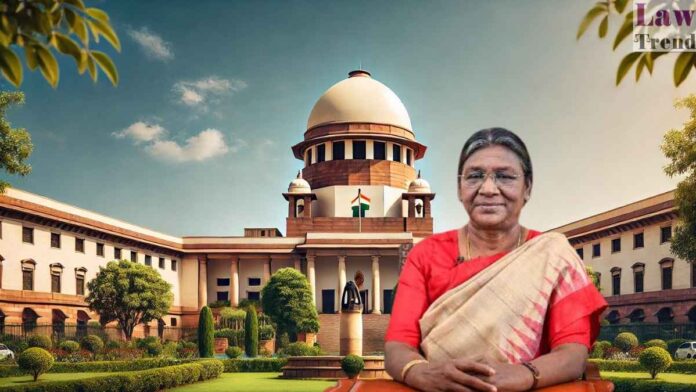The Supreme Court on Tuesday indicated that the Presidential reference made under Article 143 of the Constitution — seeking its opinion on timeframes for granting assent to legislative bills — is maintainable. The Constitution Bench remarked that there was no constitutional impropriety in the President asking for the Court’s views on such matters.
A five-judge Bench led by Chief Justice of India B.R. Gavai, and comprising Justices Surya Kant, Vikram Nath, P.S. Narasimha, and Atul S. Chandurkar, was hearing objections raised by Kerala and Tamil Nadu against the maintainability of the reference. The States argued that the reference sought to reopen issues already decided in the Court’s April ruling, which imposed timelines for Governors and the President to act on Bills passed by legislatures.
In response, the CJI questioned the premise of such objections, stating in substance: “What is wrong if the President seeks the Court’s views?”
The Court also clarified that it was acting under its advisory jurisdiction and not sitting in appeal over its previous decision. It emphasised that even if the Court finds the earlier ruling questionable, its opinion under Article 143 would not amount to overruling that decision.
During the hearing, Solicitor General Tushar Mehta submitted that even in advisory jurisdiction, the Court had the power to overrule past judgments. To this, the Chief Justice observed that while the Court can express a differing constitutional interpretation, the original ruling continues to hold the force of law. “A legal view may change, but a final decision is not undone by advisory opinion,” the CJI noted.
Background of the Reference
The reference stems from the judgment in State of Tamil Nadu v. The Governor of Tamil Nadu & Anr., delivered in April 2024 by Justices J.B. Pardiwala and R. Mahadevan. The Court in that case ruled that:
- The Governor must act on a Bill within a reasonable time under Article 200.
- Constitutional silence cannot justify indefinite delay in decision-making.
- The President’s powers under Article 201 are not immune from judicial review.
- The President must act within three months and provide reasons for any delay beyond that, with such reasons conveyed to the concerned State.
Following this ruling, the President submitted a reference under Article 143, posing 14 constitutional questions to the Supreme Court. These include whether the judiciary can prescribe procedures in areas where the Constitution is silent, and whether time-bound directives intrude upon the discretionary space constitutionally granted to the President and Governors.
States Challenge Maintainability
Kerala urged the Court to return the reference unanswered, describing it as an indirect attempt to overturn a binding ruling without a formal review. Tamil Nadu echoed this stance, arguing that the reference was effectively an appeal disguised as a constitutional query.
Both States contended that the April ruling had settled the interpretation of Articles 200 and 201, and that reopening the issue through an Article 143 reference would undermine judicial finality.
Centre Supports Reference
The Central government opposed the States’ objections, defending the reference as valid. It argued that the powers of the President and Governors concerning assent to Bills are “high prerogative functions” under the Constitution and cannot be limited by judicially imposed deadlines.
Court to Proceed on Merits
Clarifying that it was not reviewing or appealing its earlier judgment, the Bench stated that its opinion in this matter will carry constitutional weight but will not nullify the April ruling. The hearing will continue as the Court now turns to address the substantive constitutional questions raised in the Presidential reference.




